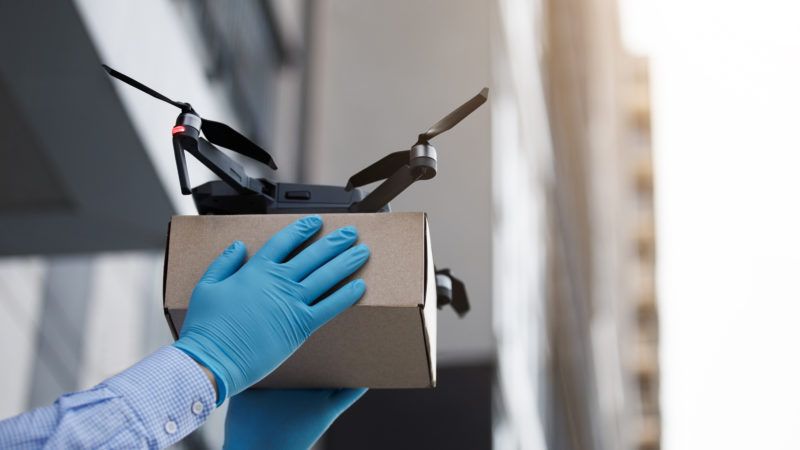Coronavirus Pandemic Paving the Way for Drone Delivery Services
The government granted a temporary waiver allowing drone-based deliveries of medical supplies in North Carolina. That shouldn't end when the pandemic does.

Several times every day, a small, white, airplane-shaped object launches from a race track next to a warehouse in Kannapolis, North Carolina, and heads west. In the skies above a hospital in the Charlotte suburbs, the drone dumps its load: a box of medical supplies that floats to a target on the ground with the aid of a parachute.
The first-of-its-kind experiment in using drones to make long-distance deliveries of personal protective equipment (PPE) and other supplies to American hospitals is another sign of how the coronavirus pandemic is prompting the government to sweep aside unnecessary regulations and create opportunities for innovation—in this case, the ultimate form of contactless delivery.
Zipline, the company whose drones are making the roughly 30-mile round trip from Kannapolis to Novant Health Huntersville Medical Center several times each day, has been operating in Africa for years, delivering medical goods to rural parts of Ghana and Rwanda. The company says it has the ability to deliver up to two tons of inventory across nearly 8,000 square miles.
But doing the same in the United States remains largely illegal, thanks to Federal Aviation Administration (FAA) rules prohibiting drones from operating beyond a controller's line of sight. That same rule is why pizza can be delivered via drone in New Zealand but not in the United States.
Last month, the FAA issued a temporary waiver to let Zipline test its drone-delivery system in North Carolina. Although the company is currently only flying supplies to the one hospital in Huntersville, administrators for Novant Health say they hope to expand the service to include some of their other locations in the state. The ultimate goal is to deliver medical supplies directly to patients' homes.
"We're likely in for a long-term fight against COVID-19. Using contactless drone logistics will be an important tool in that effort," Zipline CEO Keller Rinaudo said in a statement announcing the partnership with Novant Health. "The work underway here in North Carolina will provide the rest of the country with a blueprint for how to build the most resilient and responsive health care system possible."
Besides requiring less person-to-person contact, the drones can also get where they need to go faster than delivery trucks. Zipline says each of its 11-foot wingspan drones can carry four tons and travel up to 80 mph—zooming directly from the distribution center to the hospital over highways, golf courses, and neighborhoods.
The FAA's waiver is due to expire on October 10, or "until all COVID-related restrictions on travel, business, and mass gatherings have been lifted for the state of North Carolina, whichever date occurs first." But if Zipline's experiment with drone delivery proceeds safely, there's no reason why the FAA's line-of-sight rule shouldn't be scrapped entirely, or at least significantly pared back.
"Even after the pandemic eases or ends, drone delivery of prescriptions and other medical supplies will remain important for many people in underserved parts of the country," argue Justin Leventhal and Darcy Bryan of the Mercatus Center, a pro-market think tank based at George Mason University.
In Florida, for example, UPS and CVS have announced a partnership to use drones to deliver prescriptions to The Villages, a massive retirement community. The drones bring the medications to a central location within the community, and then UPS handles door-to-door delivery.
In Maryland, a drone recently delivered a kidney from a donor in one hospital to a recipient in another.
While there are several issues that need to be worked out—like how to safely include large numbers of long-range drones into existing airspace channels—Leventhal and Bryan point out that there is tremendous potential to benefit "people with poor mobility, compromised immune systems, or other personal constraints that make travel difficult or dangerous" with autonomous medical delivery.
Or deliveries of other products. Wing, an experimental drone-based delivery service run by Alphabet, Google's parent company, recently received an FAA waiver to use drones to deliver library books in Christiansburg, Virginia. The company is also testing a grocery delivery service in the town.
The FAA should get out of the way to allow more drone-based deliveries. And if companies like Zipline demonstrate that they can operate safely in American skies, those regulations should remain grounded after the pandemic has passed.

Show Comments (16)